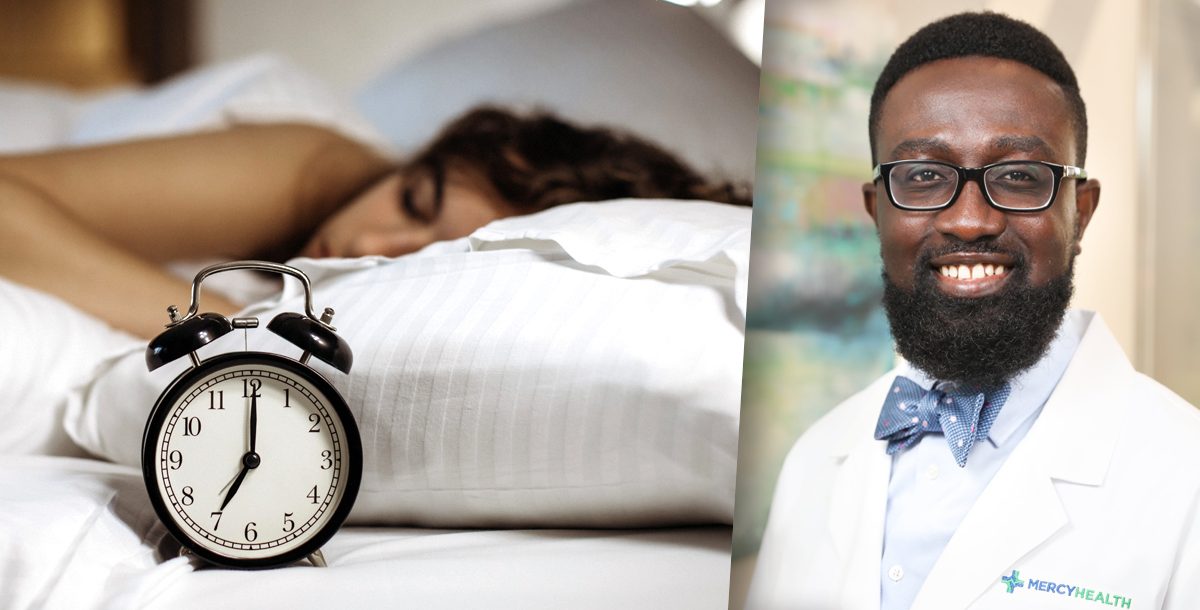Daylight saving time is coming to an end later this week. Setting our clocks back can cause big problems to sleep cycles as well as overall health. And even though we get an “extra hour” of sleep, this isn’t always what our bodies need.
We spoke with Stephen Adu-Yeboah, MD, a physician at Mercy Health – Kings Mills Primary Care who is board-certified in sleep medicine, and asked about the best things people can do to help themselves and their families adjust to the time change.
“Although the change is only by one hour, it can cause meaningful sleep disruptions,” Dr. Adu-Yeboah shares right off the bat.
First, focus on your sleep hygiene.
Keeping a bedroom environment comfortable for sleep is very important. The healthy habits that can help to achieve this environment are called “sleep hygiene.”
“Good sleep hygiene will pay dividends during time changes and throughout the year,” Dr. Adu-Yeboah says.
He recommends the following habits for building healthy sleep hygiene:
- Maintaining a fixed sleep schedule on both weekdays and weekends.
- Keeping a stable routine to get ready for bed each night.
- Limiting or avoiding caffeine and alcohol, especially in the afternoon and evening.
- Going “device free” for at least 30 minutes before bed.
- Blocking out unwanted noise and light from your bedroom and/or using accessories, like a sleep mask and ear plugs.
- Choose a supportive mattress and comfortable bedding.
Second, prioritize good sleep habits.
When it comes to the fall time change, many people feel refreshed and more alert thanks to the extra hour of sleep. Still, Dr. Adu-Yeboah suggests taking this opportunity to improve sleep habits.
For the upcoming time change specifically, the American Academy of Sleep Medicine (AASM) recommends the following sleep habits, especially for sleep-deprived individuals:
- Going to sleep at their usual bedtime on Saturday night before the fall back occurs
- Waiting until bedtime to adjust their clocks
- Setting their alarm for Sunday morning at the normal wake-up time
Third, get out in the sun when you can.
While some people may welcome the extra hour of sleep, it also means our days will now get darker sooner.
“Light is one of the most important environmental factors that can synchronize our biological clock,” Dr. Adu-Yeboah explains.
He suggests finding time for daylight exposure on the days following the time changes to help you acclimate to the new time schedule. The sun and light can help boost energy levels and keep you feeling happy throughout the day.
And fourth, don’t forget about your mental and physical health.
Studies have found an association between the daylight saving time transitions and short-term risk of heart attacks, stroke, traffic accidents, emergency room visits and serious mood disturbances. Also, people’s thinking, decision-making and productivity can be affected during this transition.
While the exact reason behind these occurrences or the underlining pathophysiology is not clearly defined, it is nevertheless still important to monitor how you are feeling, both mentally and physically, during the days following the upcoming time change.
Dr. Adu-Yeboah adds that the time change is a great health reminder to schedule your annual exams with your primary care provider. Find a Mercy Health provider near you today.






